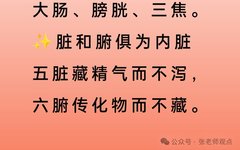01
All Courses by Ni Haixia
02
Complete Guide to TCM Treatments for Common Diseases
03
Focused Study on TCM Topics
04
Online Reading of TCM Learning Books
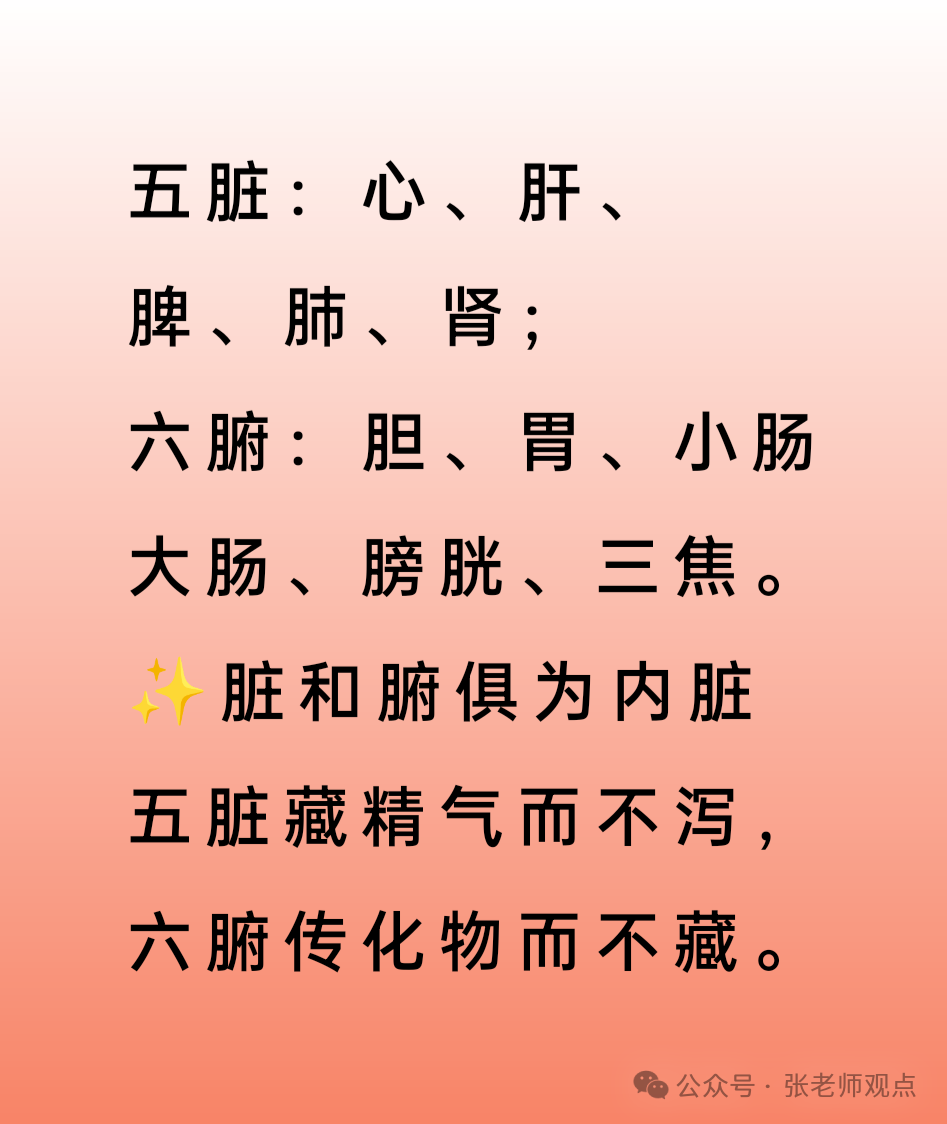
The Five Organs are the heart (xin), liver (gan), spleen (pi), lungs (fei), and kidneys (shen).
The Six Bowels are the gallbladder (dan), stomach (wei), small intestine (xiao chang), large intestine (da chang), bladder (pang guang), and the san jiao (triple burner).
The organs and bowels are both considered internal organs, but their distinctions are:
The Five Organs store essence and qi without excreting, while the Six Bowels transmit and transform substances without storing. Organs that have the function of receiving, transporting, and transforming food and fluids belong to the bowels; those that do not directly transform food and fluids but have the function of storing essence belong to the organs.
1. Heart (Xin)
The heart generates blood and houses the spirit. It is the ruler of life activities in the body. If the heart is not healthy, or is stimulated by emotions, or is invaded by pathogens, it can lead to symptoms such as palpitations, anxiety, insomnia, forgetfulness, inappropriate laughter, or delirium and confusion.
When the heart undergoes pathological changes, it not only loses its autonomy but can also disrupt the activities of other organs.
2. Liver (Gan)
The liver stores blood and governs planning. The liver is strong in nature, hence it is also called the general; when stimulated by emotions, it often affects its normal function, leading to anger, headaches, and even upward fire causing blood to vomit. The liver is also considered the “pre-natal” for women (which includes reproductive functions), thus regulating menstruation and fertility must emphasize liver treatment.
3. Spleen (Pi)
The spleen governs blood and is responsible for transformation. The main source of life force is nutrition; the spleen digests food and transports its essence throughout the body, hence it is called the “post-natal” foundation. If the spleen’s ability to transform is insufficient, it can lead to bloating after eating, resulting in muscle wasting and fatigue. The spleen also governs the transformation of dampness; symptoms of damp stagnation, such as chest tightness, nausea, diarrhea, and edema, are often due to spleen weakness, thus methods to benefit dampness often use spleen strengthening techniques.
4. Lungs (Fei)
The lungs govern qi and are responsible for clearing and regulating. If lung qi does not descend, it can easily lead to cough and asthma; in cases of deficiency, it is often seen as shortness of breath and weak speech. The lungs have a regulatory effect on the blood circulation governed by the heart; ancient texts described the heart as the ruler and the lungs as the minister.
5. Kidneys (Shen)
The kidneys store essence and govern strength. The kidneys play a positive role in maintaining vitality; kidney deficiency can lead to symptoms such as dizziness, tinnitus, poor vision, low back pain, weakness in the legs, and lethargy. The kidneys are considered the “pre-natal” for men, similar to the liver’s role for women, referring to reproductive functions. Thus, symptoms like decreased libido, nocturnal emissions, cold semen, and premature ejaculation are treated through the kidneys.
The kidneys have a unique characteristic compared to other organs, as there are two kidneys; the left is the kidney, and the right is the mingmen (gate of life), the kidney governs yin, and the mingmen governs yang, hence the kidneys are also called the “water-fire organ”. The true yin and true yang referred to in clinical practice also point to this.
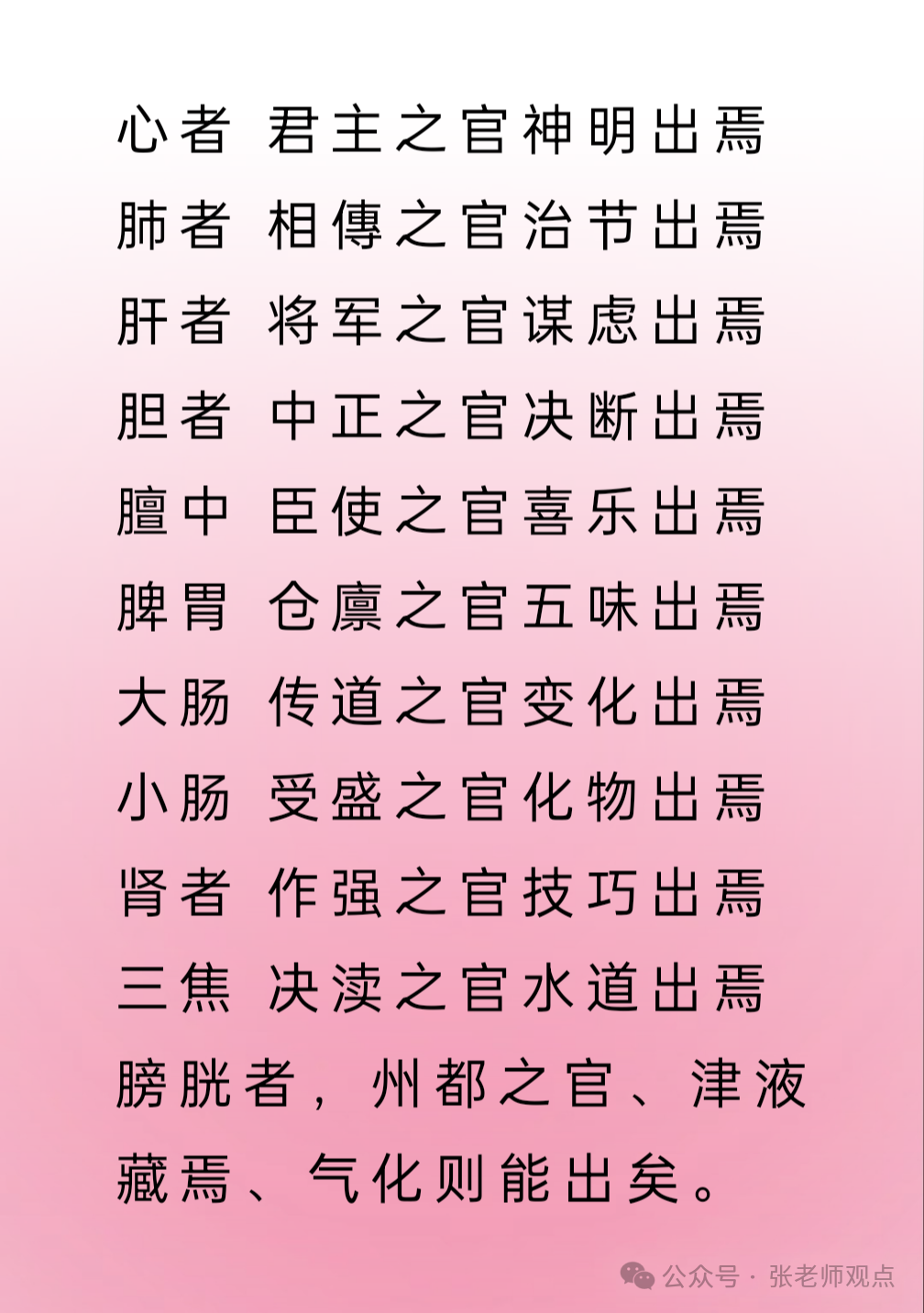
6. Gallbladder (Dan)
The gallbladder is the organ of clarity, governing decision-making. The gallbladder and liver are interrelated; although the liver qi is strong, without the gallbladder’s continuity, the liver and gallbladder work together to achieve courage. The human body is the “fire of the ruler”, while the gallbladder and mingmen are the “fire of the minister”. If gallbladder fire is excessive, symptoms such as irritability, headaches, chest tightness, rib pain, bitter mouth, and vomiting of bitter fluids may occur.
7. Stomach (Wei)
The stomach is the sea of food and fluids, responsible for receiving. The stomach and spleen are interrelated; although the stomach is responsible for receiving, and the spleen for digestion, the stomach’s basic function is to receive and digest, hence the stomach and spleen are often mentioned together. It is believed that if the stomach cannot receive, digestion cannot occur, thus it is said, “If food is received, one thrives; if food is cut off, one perishes; with stomach qi, there is life; without stomach qi, there is death”, highlighting the importance of the stomach’s function.
8. Small Intestine (Xiao Chang)
The small intestine is the organ of reception and storage, responsible for transformation. The small intestine receives the food and fluids that have been digested by the stomach, further separating the clear from the turbid, allowing the essence to be stored in the five organs and the waste to be excreted through the six bowels, with the waste’s liquid returned to the bladder and the residue to the large intestine. These are the functions of the small intestine in transformation.
9. Large Intestine (Da Chang)
The large intestine is the organ of conduction, responsible for excretion. The large intestine receives the waste from the small intestine and is responsible for transporting and excreting it, being the final stage of the entire digestive process. Due to the large intestine’s function of conducting waste, it is responsible for bowel movements; thus, any issues with constipation, diarrhea, dysentery, or blood in the stool are addressed through the large intestine, employing methods of conduction, moistening, and binding.
10. Bladder (Pang Guang)
The bladder is the official of the state, responsible for qi transformation. The bladder is where water and fluids accumulate; if qi transformation is obstructed, it can lead to urinary retention; if qi transformation is excessive, it can lead to incontinence. However, the bladder’s qi transformation is related to the kidneys; if kidney qi is sufficient, transformation can occur; if kidney qi is deficient, transformation cannot occur, thus treatments for urinary difficulties or incontinence sometimes employ warming the kidneys.
11. San Jiao (Triple Burner)
The san jiao is the official of drainage, responsible for the movement of water. The san jiao consists of the upper jiao, middle jiao, and lower jiao. Its main function is to open the waterways; for example, to treat water retention and fullness, methods to promote qi are often used to assist in water movement, known as promoting qi, often using medications that smooth the san jiao.
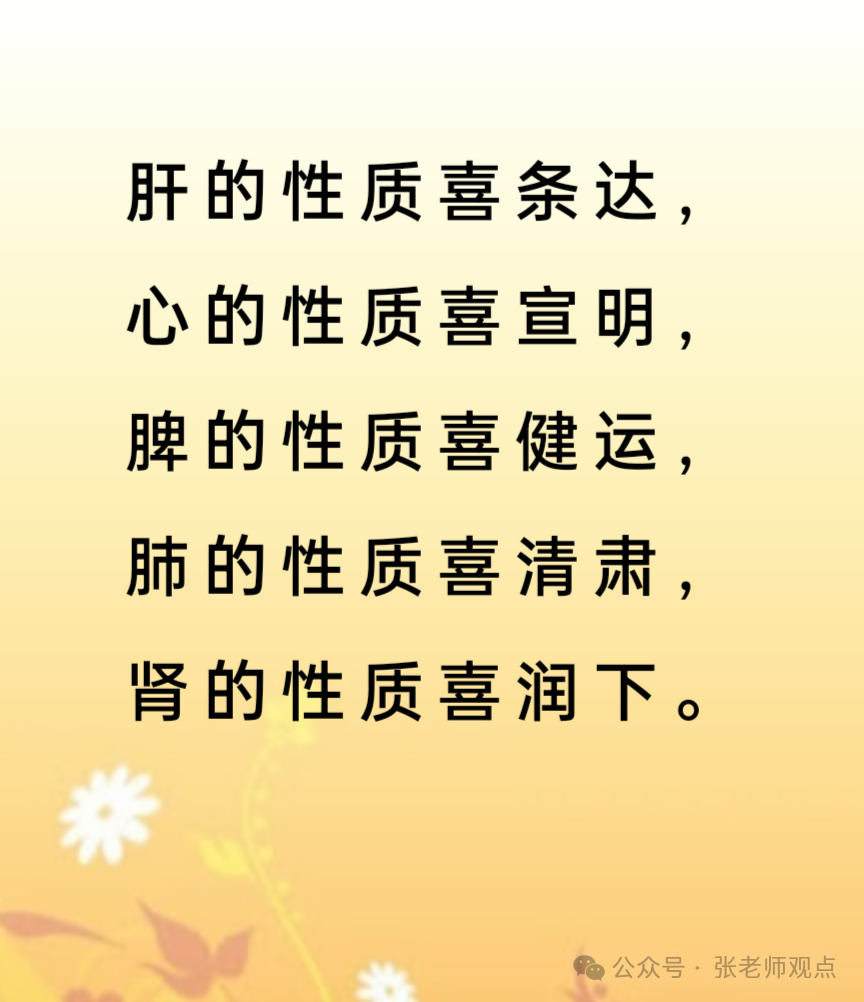
Mutual Governance: There is a “mutual governance” relationship between the organs, such as
The kidney governs the heart, the heart governs the lungs, the lungs govern the liver, and the liver governs the spleen. Governance means to preside, indicating mutual restriction to maintain balance.
Mutual Cooperation: There is also a “mutual cooperation” relationship between the organs and bowels, such as
The lungs cooperate with the large intestine, the heart with the small intestine, the liver with the gallbladder, the spleen with the stomach, and the kidneys with the bladder. Cooperation means to work together, indicating that the organs serve as the body, while the bowels serve as the function, working together to complete their combined functions.
Exterior and Interior: The organs are yin and belong to the interior, while the bowels are yang and belong to the exterior, hence this cooperation is also called “exterior and interior”.
① The relationship between the internal organs and the body’s various tissues and organs is often used in clinical practice, such as:
The liver opens to the eyes, fills the tendons, and manifests in the nails;
The heart opens to the tongue, fills the vessels, and manifests in the face;
The spleen opens to the mouth, fills the flesh, and manifests in the lips;
The lungs open to the nose, fill the skin, and manifest in the hair;
The kidneys open to the ears, fill the bones, and manifest in the hair.
The spleen governs the four limbs and is associated with the joints:
The elbows belong to the heart and lungs,
The armpits belong to the liver,
The hips belong to the spleen, and the knees belong to the kidneys.
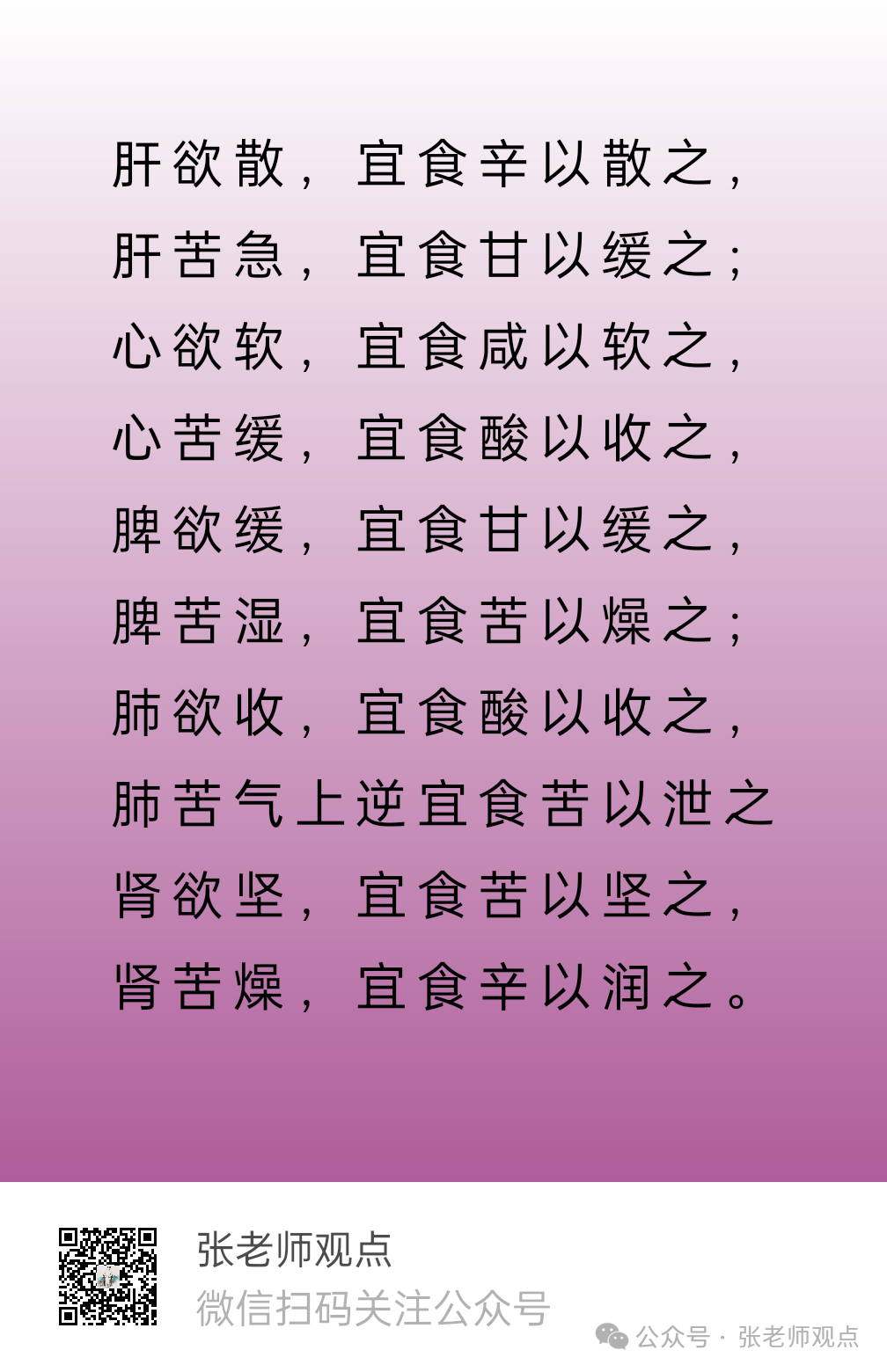
② The properties of the Five Organs:
The liver’s property is to prefer smoothness, the heart’s property is to prefer clarity,
The spleen’s property is to prefer strong movement, the lungs’ property is to prefer clarity and regulation,
The kidneys’ property is to prefer moistening and descending.
In treatment, there is a pattern:
If the liver desires to disperse, it is advisable to eat pungent foods to disperse it; If the liver is bitter and urgent, it is advisable to eat sweet foods to alleviate it;
If the heart desires to soften, it is advisable to eat salty foods to soften it; If the heart is bitter and slow, it is advisable to eat sour foods to gather it;
If the spleen desires to relax, it is advisable to eat sweet foods to relax it; If the spleen is bitter and damp, it is advisable to eat bitter foods to dry it;
If the lungs desire to gather, it is advisable to eat sour foods to gather it; If the lungs are bitter and qi is rising, it is advisable to eat bitter foods to drain it;
If the kidneys desire to strengthen, it is advisable to eat bitter foods to strengthen it; If the kidneys are bitter and dry, it is advisable to eat pungent foods to moisten it.
③ Judging the pathological changes of the Five Organs: By comparing the normal and abnormal states of the organs, one can discern internal organ pathologies, such as:
The heart houses the spirit; if one laughs often, it indicates an excess of spirit; if one cries often, it indicates a deficiency of spirit;
The lungs govern qi; if one coughs and has asthma, it indicates an excess of qi; if one has shortness of breath and difficulty breathing, it indicates a deficiency of qi;
The liver governs blood; if one is easily angered, it indicates an excess of blood; if one is fearful and timid, it indicates a deficiency of blood;
The spleen governs form; if one has abdominal distension and urinary difficulties, it indicates an excess of form; if one has weakness in the limbs, it indicates a deficiency of form;
The kidneys govern will; if one has diarrhea and distension, it indicates an excess of will; if one has counterflow, it indicates a deficiency of will.
For example:
If there is fullness in the chest and abdomen, and the voice is heavy and unclear, it indicates accumulated dampness in the middle jiao;
If the speech is low and cannot be continued, it indicates extreme deficiency of qi;
If one speaks without regard for closeness or distance, and does not cover oneself with clothing, it indicates disordered spirit;
If there is excessive diarrhea, it indicates that the large intestine is not firm;
If there is incontinence, it indicates that the bladder cannot restrain.
For example:
The head is the residence of the spirit; if the head droops and cannot be raised, and the eyes are sunken and lack brightness, it indicates extreme fatigue of spirit;
The back is the residence of the chest; if the back is hunched and the shoulders droop, it indicates weakness of organ qi;
The waist is the residence of the kidneys; if there is pain in the waist and one cannot turn, it indicates kidney deficiency;
The knees are the residence of the tendons; if the joints are stiff and movement is difficult, it indicates weakness of tendons;
The bones are the residence of the marrow; if one cannot stand for long, and the body shakes when standing, it indicates weakness of bones.
Such examples illustrate that what is within manifests on the outside, thus it is possible to infer internal conditions from external signs, which is greatly helpful in clinical practice.
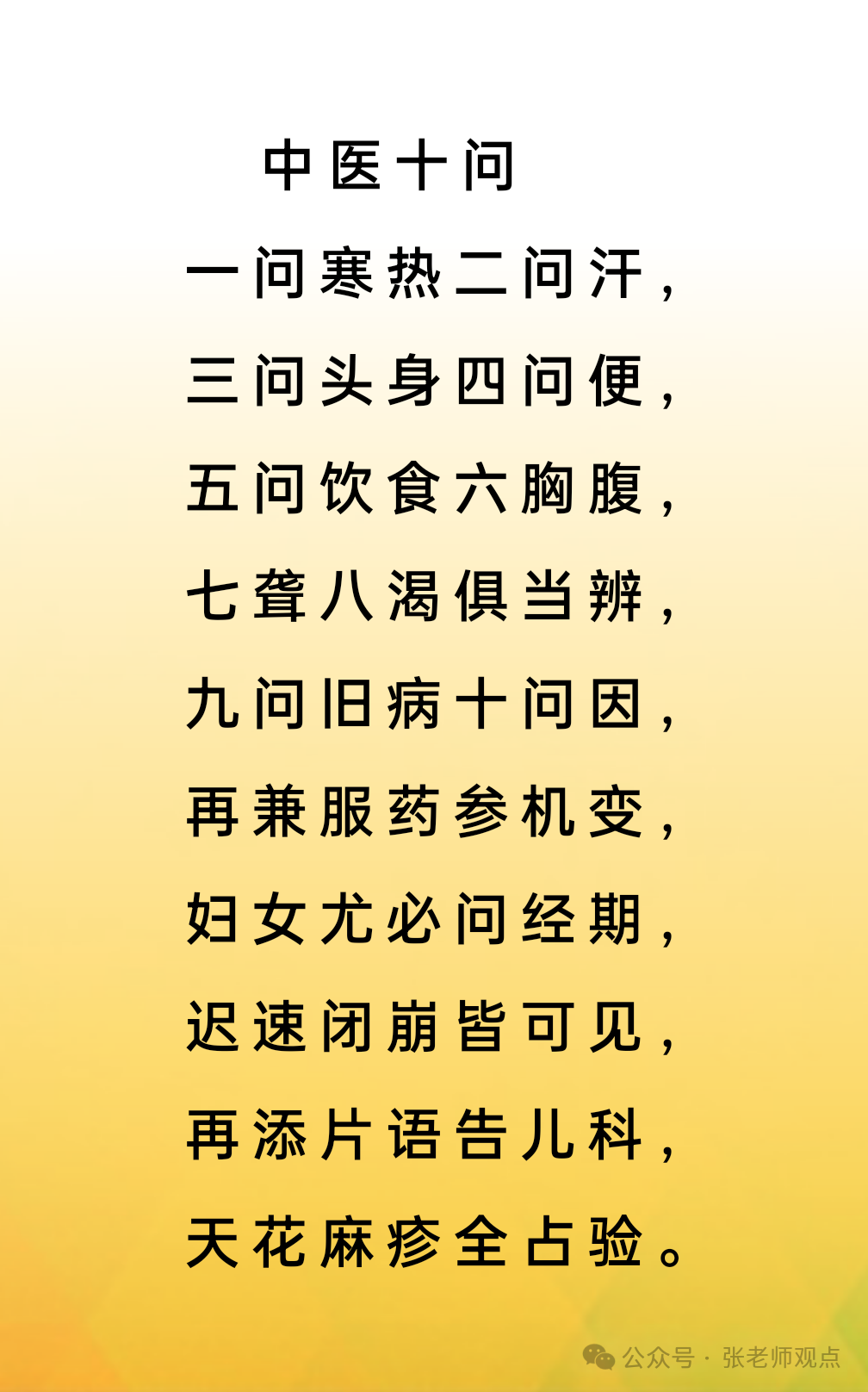 This article is an excerpt from study notes, and the content is for health reference only. For any illness, please seek treatment at a regular hospital.
This article is an excerpt from study notes, and the content is for health reference only. For any illness, please seek treatment at a regular hospital.

